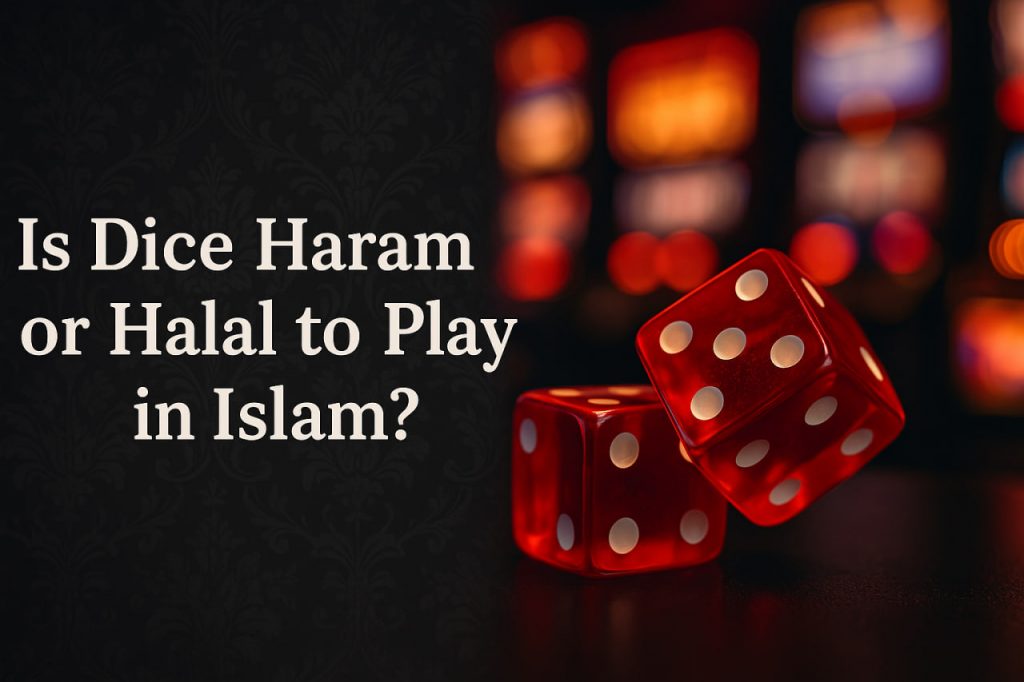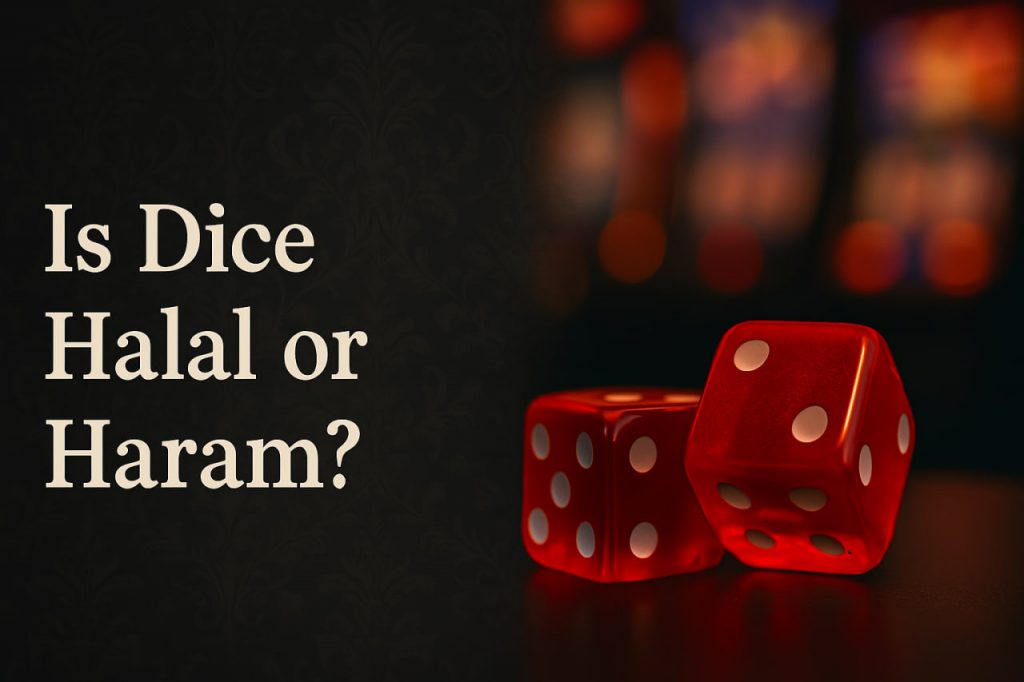Is Dice Haram or Halal to Play in Islam?

Games and entertainment have always been a part of human culture, but in Islam, they are evaluated through the lens of Shariah. One question often asked by Muslims is: “Is dice halal?” or “Is dice haram?” This article explores the Islamic rulings on dice games, supported by hadiths, scholarly opinions, and contextual reasoning. Understanding the context of Islamic teachings and how they apply to everyday entertainment is essential for Muslims striving to live a life aligned with Islamic values. The issue is not just about a simple game, but about principles that form the foundation of a healthy spiritual and social lifestyle in Islam.
What Does Islam Say About Dice?
Islamic teachings emphasize avoiding games or actions that lead to gambling, wasting time, or promoting negative behavior. The game of dice has been directly addressed in the Hadith of Prophet Muhammad ﷺ. In these traditions, dice are singled out as a game to be avoided due to their historical association with gambling and randomness. The nature of dice as a tool of chance makes it fundamentally different from skill-based games, and this distinction is crucial in determining its Islamic ruling.
🔹 Key Hadith About Dice:
The Prophet ﷺ said:
“Whoever plays with dice, it is as if he dipped his hand in the flesh and blood of a pig.”
(Sahih Muslim 2260)
Another narration states:
“Whoever plays with dice, has disobeyed Allah and His Messenger.”
(Abu Dawood 4938)
These hadiths show a strong prohibition and clear disapproval. The severity of the language used highlights how serious this issue was considered in the early Islamic community. The symbolism of comparing dice-playing to touching pig flesh emphasizes impurity and disobedience. But to understand the full context and applicability to modern times, we must consider how dice are used today versus in the past.
Play Halal-Approved Dice Chosen by Our Team
Many online dice games are built around real-money gambling and chance-based profit, which makes them haram in Islam. Our team has reviewed different dice options and selected a Shariah-verified version that removes the gambling component and focuses on safe, halal-friendly gameplay.
- ✔ Carefully reviewed and Shariah-checked dice game
- ✔ No betting, no real-money wagering, no random cash payouts
- ✔ A halal-conscious way for Muslims to enjoy dice-style games
Note: This halal dice recommendation is based on our team’s Shariah analysis and is for educational purposes only. For personal rulings, please consult a qualified Islamic scholar.
🧠 Why Are Dice Considered Haram?
The reasons behind the Islamic prohibition of dice can be summarized through multiple dimensions including religious, psychological, and societal concerns. Dice games are typically rooted in elements of luck and unpredictability, which Islam discourages when it leads to loss of control, excessive amusement, or moral decay.
| Reason | Explanation |
|---|---|
| Gambling Link | Dice were historically used in gambling, which is strictly haram in Islam. Their association with these sinful practices gives them a negative ruling. Even if no money is involved, the resemblance to gambling activities still renders it impermissible in many cases. |
| Wasting Time | Scholars argue that many dice games are purely recreational and serve no productive purpose, leading to the wasting of precious time. Time in Islam is seen as a valuable asset that must be preserved and used in meaningful ways. |
| Chance-Based | Islam values fairness and effort. Dice games depend entirely on luck or randomness, and not on skill or strategy. This promotes dependence on fate rather than effort, which goes against Islamic teachings of accountability. |
| Hadith Evidence | Multiple authentic hadiths prohibit the use of dice directly, making them problematic from a fiqh (Islamic jurisprudence) perspective. Ignoring such direct instructions can lead to undermining prophetic authority and the seriousness of Islamic law. |
So when people ask “is dice haram?”—the prevailing answer among scholars is yes, especially when the game involves gambling, competition for money, or becomes a distraction from religious and moral obligations. Dice represent not only a simple gaming tool but also an opening to greater harm if boundaries are not maintained.
⚖️ Scholarly Opinions on Playing Dice

Islamic scholars across different schools of thought have examined the use of dice and issued varying degrees of prohibition based on their interpretation of religious texts and societal context. While the language of the hadith is strong, scholars have discussed whether the ruling is absolute or if exceptions exist under certain conditions.
| School of Thought | Ruling | Reason |
| Hanafi | Makruh Tahrimi (nearly haram) | Due to clear hadith prohibitions and resemblance to gambling. The Hanafi school is cautious and advises avoidance. |
| Maliki | Generally discouraged | Especially if time is wasted or stakes are involved; emphasis on intention and outcome. Occasional, non-addictive use without financial stakes may be tolerated. |
| Shafi’i | Haram | Based on authentic hadith and the risks associated with gambling-like behavior. The Shafi’i school takes a stricter approach due to the literal interpretation of hadith. |
| Hanbali | Haram | Citing the strong language in hadith and the potential moral consequences. Strongly encourages staying away from all dice games to prevent harm. |
The majority opinion tends to view dice negatively. While differences in interpretation exist, the consensus leans toward discouragement or outright prohibition. Most scholars agree that avoiding such games is better for the spiritual and social health of a Muslim.
🧹 Are All Dice Games Haram?
This is where context becomes important. Dice can be used in many different types of games—some that are purely recreational and others that are educational or social in nature. The ruling depends largely on the intention, setting, and consequences of the activity. Understanding the purpose behind playing is key.
✅ Permissible Dice Games (According to Some Scholars):
- Educational games that use dice to teach math or counting to children in school settings
- Family board games that involve teamwork or bonding, with no gambling element and played infrequently
- Games where dice play a minor role and the outcome is not entirely based on luck, such as educational strategy games
❌ Forbidden Dice Games:
- Games involving financial stakes, prizes, or rewards that mimic gambling or encourage risk-taking
- Games that encourage competition at the expense of ethics, leading to lying, cheating, or emotional distress
- Dice games that cause neglect of salah (prayers), family, or other obligations, leading to laziness or addiction
- Games that are played excessively or become central to a person’s daily activity and thoughts
When asking “is dice halal?”, it’s important to consider the nature of the game, the people playing it, and the environment in which it is played. Some scholars also stress the difference between habitual playing versus rare, purposeful playing.
📌 Is Dice Halal or Haram?

| Scenario | Is Dice Halal or Haram? | Notes |
| Playing with betting | ❌ Haram | Gambling is explicitly forbidden and a major sin in Islam |
| Playing for fun without money | ⚠️ Disliked or questionable | Scholars differ; better to avoid unless it serves a greater benefit |
| Using dice in educational settings | ✅ Halal (according to some) | Intent, purpose, and context matter significantly |
| Playing frequently with obsession | ❌ Haram | Waste of time and a distraction from worship and duties |
| Playing occasionally for education | ✅ Potentially Halal | If supervised and clearly educational, especially for children |
| Using dice in Islamic apps/tools | ✅ Permissible | When not linked to gaming or entertainment, but technical or random functions |
Understanding the balance between entertainment and responsibility is key in Islam. Halal fun is encouraged, but it must not interfere with faith, character, or purpose. Excessive or unproductive games can have long-term consequences on a Muslim’s spiritual and social well-being.
🏨 Islamic Alternatives to Dice Games
If you’re looking for halal alternatives that are fun, engaging, and spiritually safe, here are some excellent options. These activities not only entertain but also educate, strengthen family bonds, and reinforce Islamic values:
- Chess (Permissible with certain conditions: not involving betting or distraction; debated but often allowed with limits)
- Memory games (Improve cognitive abilities and are family-friendly; great for children and elders alike)
- Puzzle-solving (Stimulates the mind, promotes critical thinking, and can be enjoyed alone or in groups)
- Islamic trivia (Promotes knowledge of deen in a fun way; helps kids and adults learn together)
- Physical sports like football, badminton, archery, or swimming (Promoted in many hadith; improves physical health)
- Story-building games that promote creativity, imagination, and communication within a halal framework
- Board games without dice that focus on strategy or Islamic themes
These activities provide both entertainment and spiritual benefit when chosen wisely and played in moderation. Encouraging such alternatives in families and communities helps shift focus from doubtful activities to productive engagement.
📚 Conclusion: Is Dice Halal or Haram?
So, is dice halal or is dice haram? Based on hadith, scholarly interpretations, and general principles in Islam, the majority view is that dice games are haram or at least highly discouraged, particularly when they involve gambling, lead to wasting time, or distract from religious obligations.
However, exceptions may exist when dice are used for educational or harmless recreational purposes, especially if they serve a meaningful function and are played in moderation. The intention behind the activity, and its impact on a person’s deen and dunya, are crucial in determining its ruling.
In Islam, caution is often the best approach. If something is doubtful or potentially harmful spiritually, the better path is to leave it. As the Prophet ﷺ said: “Leave that which makes you doubt for that which does not make you doubt.” (Tirmidhi)
The overall guidance is to protect time, values, and relationships. If a game becomes a source of disobedience, distraction, or moral decay, it should be avoided regardless of how fun or common it may be. Muslims are encouraged to seek forms of entertainment that uplift their soul and foster community in a positive way.
🔍 FAQs About Dice in Islam
If there’s no betting or time wastage, some scholars allow it. But because it involves dice, it’s still a controversial area. Moderation is key. If in doubt, choose a non-dice game instead.
Most scholars permit it if the purpose is educational and there’s no gambling or addictive behavior involved. This is especially acceptable in structured classroom environments.
Factors include gambling, time-wasting, addiction, and negative moral influence. Games based on chance without purpose tend to be haram. The Islamic view promotes beneficial recreation.
If it mimics gambling or leads to excessive distraction, it should be avoided. If it’s educational and harmless, it may be permitted with limits. Always evaluate the app’s goals and user impact.
When used for technical or neutral purposes (not gaming or gambling), it is generally considered permissible. Examples include simulations, teaching tools, or statistical functions.
Reflect on the purpose and impact of the game. If it’s causing harm, addiction, or spiritual weakness, it’s wise to replace it with better alternatives. Seek forgiveness and strive for balance.

User Reviews
I used to avoid online dice games because of the gambling element, but this site helped me find a Shariah-verified option. Now I can enjoy dice-style gameplay in a halal way, which feels much better.
The halal dice recommendation on this website is very helpful. I appreciate how clearly you explain why normal dice gambling is haram and then provide a safe alternative for Muslims.
I’m really grateful for this site. It guided me away from risky, gambling dice games and towards a Shariah-checked version that I can play with peace of mind as a Muslim.
Finding halal-friendly dice games was almost impossible before I discovered this page. The Shariah-verified option you recommend is exactly what I was looking for. Jazakum Allahu khayran.